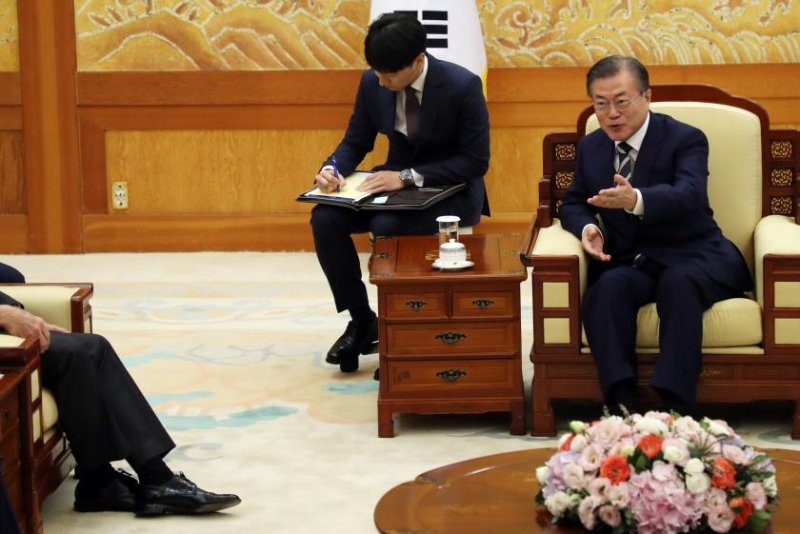South Korean President Moon Jae-in (R) talks with U.S. Secretary of Defense Mark Esper during their meeting at the presidential office Cheong Wa Dae in Seoul on Friday. Photo by Yonhap
SEOUL, Aug. 9 (UPI) -- U.S. Defense Secretary Mark Esper and South Korean President Moon Jae-in discussed trilateral security cooperation with Japan amid a swirling trade and diplomatic dispute between the Asian neighbors, the presidential Blue House said on Friday.
Esper, who was sworn in as secretary of defense on July 23, is on his first visit to Seoul as part of an Asian trip to a region that is on edge from four North Korean missile tests in less than two weeks and a deteriorating relationship between South Korea and Japan.
South Korea and Japan have been at odds since Tokyo placed export restrictions on key materials used in high-tech manufacturing at the beginning of July and removed South Korea from its "white list" of preferred trade partners last week.
Seoul has vowed retaliatory measures, and announced that it would review whether to renew a military intelligence sharing pact with Japan.
The agreement, called General Security of Military Information Agreement, or GSOMIA, was signed in 2016 and allows for the two U.S. allies to share information on regional threats including North Korean nuclear and missile developments.
Both Esper and Moon agreed that the GSOMIA issue should be "resolved," according to brief comments shared by the president's office, but did not go into detail on how what a resolution would entail.
Esper has urged maintaining the agreement in previous remarks.
"I would honestly encourage intel-sharing to continue," he said to reporters on Tuesday while en route to Japan. "It's key to us in our common defense against North Korea."
Esper said ahead of the visit that his key message in both Tokyo and Seoul would be to concentrate on the threats from North Korea and China, which he called "really big challenges in the near term."
"So I'd ask [Japan and South Korea] to both resolve this issue quickly and let's really focus on North Korea and China."
During a meeting Wednesday with his Japanese counterpart, Defense Minister Takeshi Iwaya, both sides agreed that it was important to maintain GSOMIA, local media reported.
The agreement is valid for a year at a time, but automatically renews unless one side decides to dissolve it. This year's deadline for announcing a decision to leave the agreement is Aug. 24.
Public opinion on whether to stay in the pact has been sharply divided in South Korea, where a massive consumer boycott of Japanese products has been gaining steam. A survey released by pollster Realmeter on Wednesday found that nearly 48 percent of South Koreans favored leaving GSOMIA, while 39 percent opposed withdrawal.
The division has fallen along political lines, with liberals and those identifying with the ruling Democratic Party favoring withdrawal and conservatives tending towards staying.
At a small rally outside the U.S. Embassy in downtown Seoul on Friday, conservative demonstrators urged South Korea and Japan to maintain a positive trilateral relationship with the United States.
"We need a good relationship between Korea and Japan," said Yoo Jong-youl, a former professor who was one of the organizers of the event. "Both sides will benefit for security. Let the past be the past."
Earlier on Friday, Esper met with his Korean counterpart, Defense Minister Jeong Kyeong-doo, and Foreign Minister Kang Kyung-wha. In a statement, Esper and Jeong reaffirmed their "commitments to supporting their diplomatic efforts for the complete denuclearization of the Korean Peninsula."
No mention was made publicly whether discussions were held about South Korea increasing its share of the costs for U.S. defense support, an issue that President Trump has raised frequently and brought up again this week.
President Trump tweeted on Wednesday morning that South Korea had agreed to pay "substantially more money" to the United States in order to defend itself from North Korea. South Korea's current one-year agreement calls for it to pay roughly $925 million this year to support the U.S. military presence, included some 28,500 troops.
Trump claimed in his tweet that talks had already begun a new cost-sharing agreement, but South Korea's foreign ministry responded that discussions were not yet underway.















